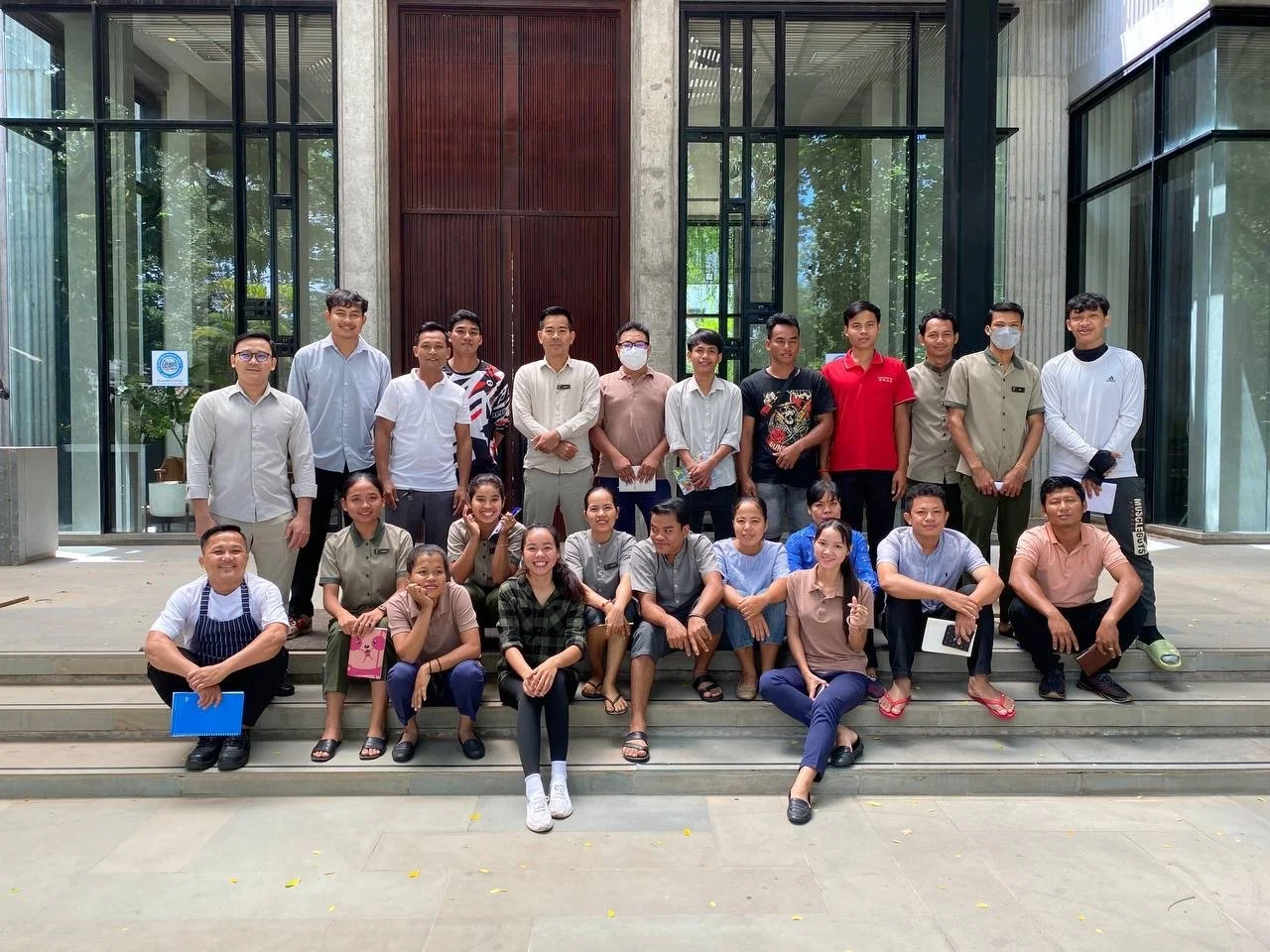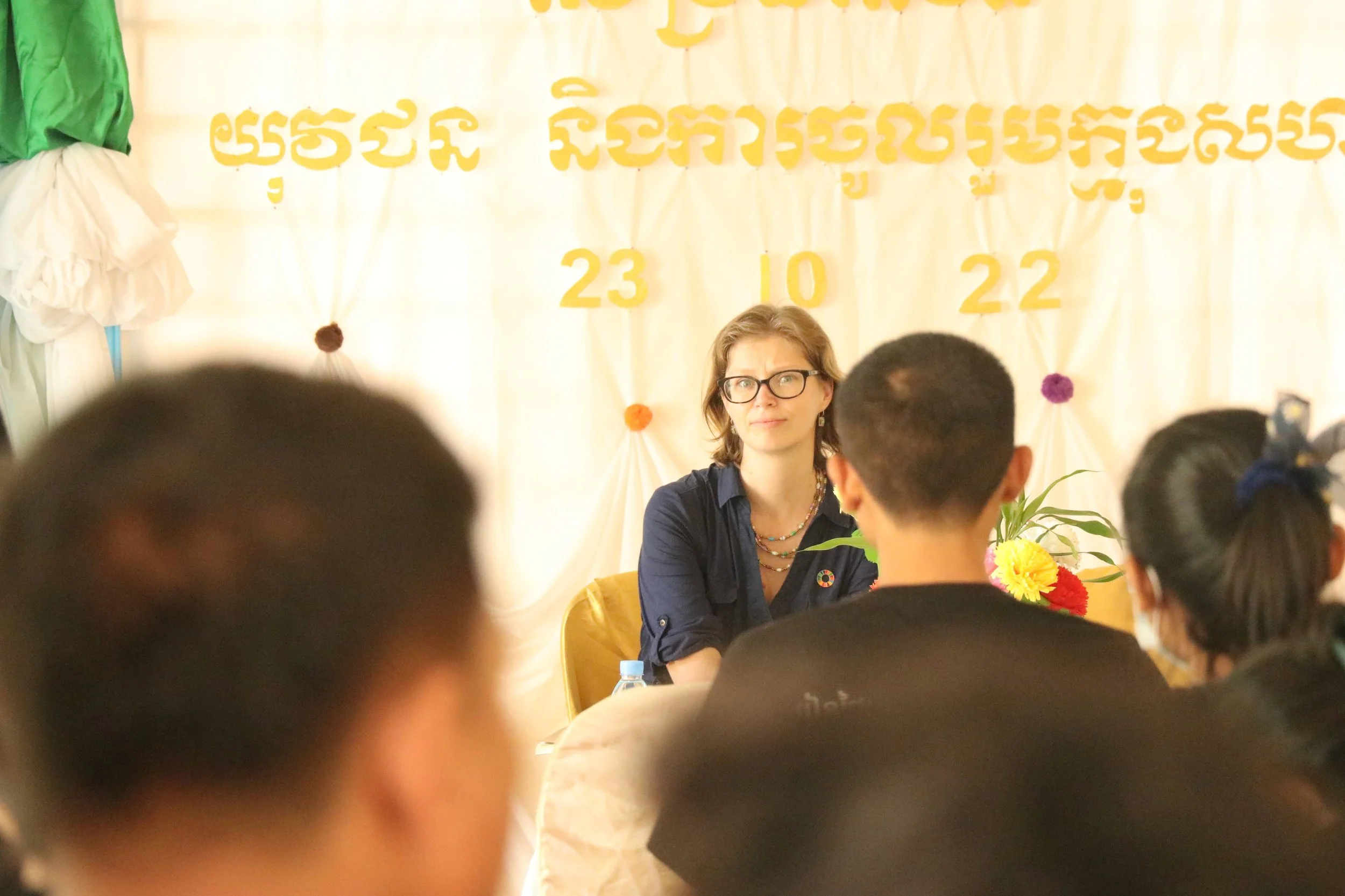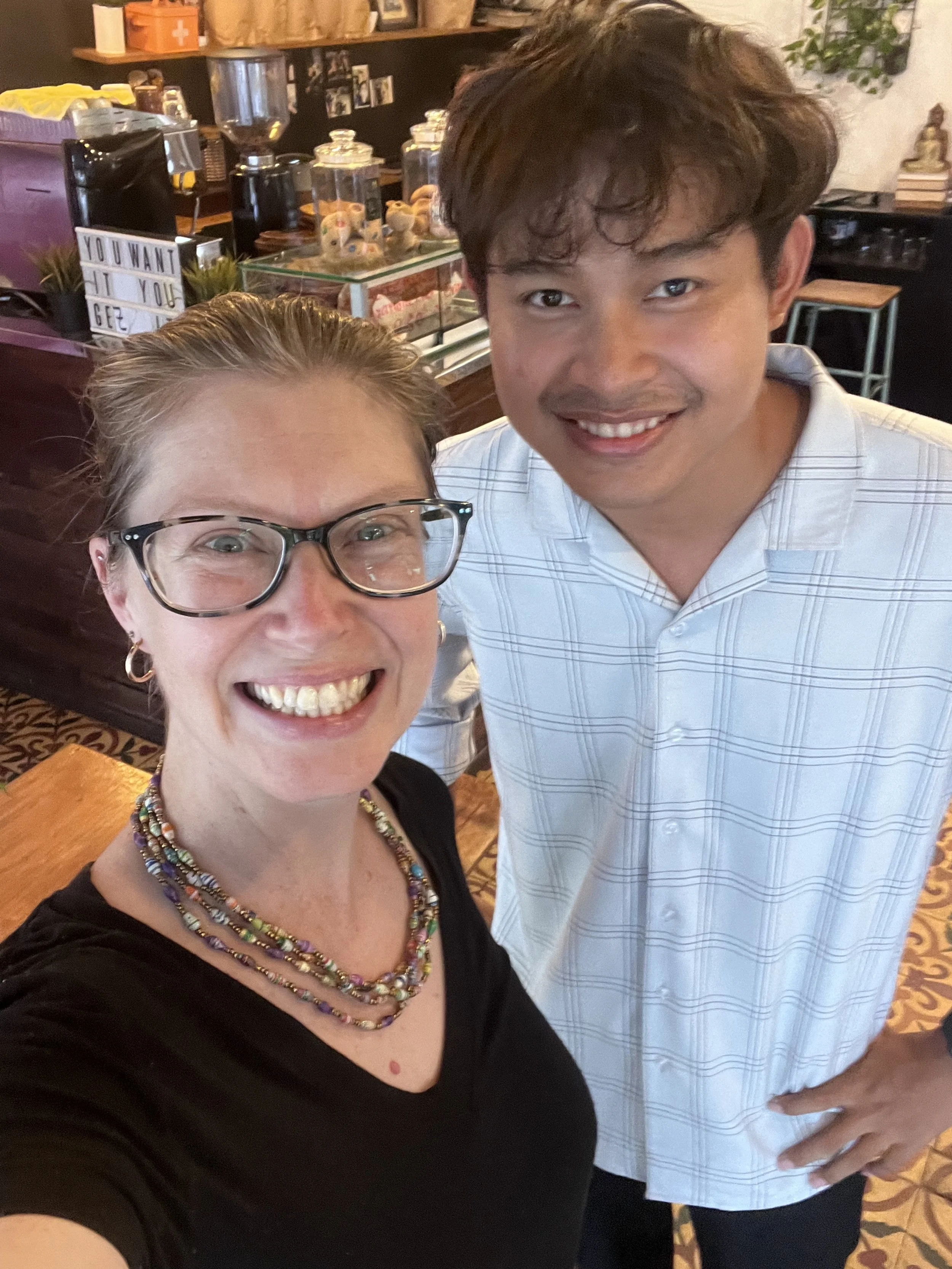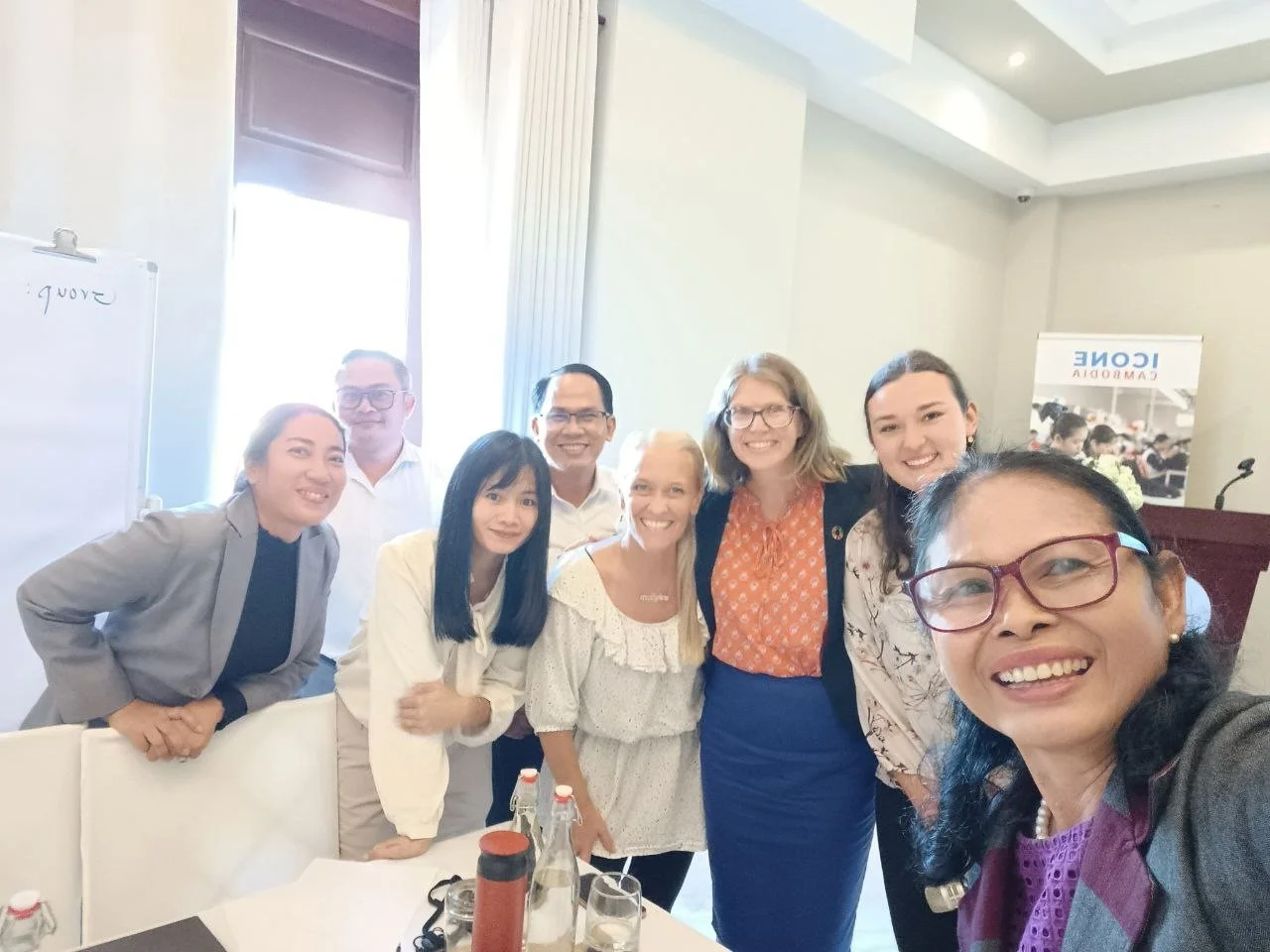Sarah Rhodes: Empowering Hotels to Combat Plastic Pollution for a Greener Tomorrow
By: Rhea Vitto Tabora
Like the powerful currents shaping our world's oceans, Sarah Rhodes’s mission to tackle plastic pollution flows with an unstoppable force.
Her social impact business, Plastic Free Southeast Asia (PFSEA), stands as a testament to her vision.
With a visionary approach, she designs and implements transformative programs that inspire hotel businesses to take effective steps and rise above plastic overconsumption, nurturing a renewed sense of awareness and responsibility.
Through powerful accountability partnerships and collaboration with industry players, Sarah dismantles the foundations of plastic dependency, forging a path towards a plastic-free future.
Recognizing that responsible travel is a linchpin of sustainability, she empowers hotels to redefine their practices, eliminating single-use plastics and embracing eco-friendly alternatives. With her guidance, businesses become catalysts for change, fostering a cleaner and more environmentally conscious tourism landscape.
Driven by her vision and passion, Sarah is committed to steering the tourism industry toward a future where plastic pollution becomes a distant memory.
Brace yourself for the ripple effect of her endeavors—a tidal wave of transformation washing away our reliance on plastic, leaving behind a pristine legacy for future generations.
With a master's degree in Tourism Management and qualifications as a 'Climate Leader' and 'Blue Standard Consultant,' Sarah’s expertise in sustainability and environmental conservation is one to admire. Her profound impact on businesses and individuals in the tourism sector has shifted mindsets and catalyzed tangible change across the Southeast Asian peninsula.
From the annual Plastic-Free July program to projects like online courses expanding the reach of PFSEA's workshops, Sarah’s dedication to education and empowerment of hoteliers helps shape a plastic-free future for Southeast Asia.
Can you tell us more about your background and how you became passionate about sustainability in the tourism industry? How did your journey lead you to set up Plastic Free Southeast Asia?
Looking back at my journey, I can see various clues that led me to become passionate about sustainability in the tourism industry. From a young age, I was always fascinated with travel and different places. In school, when given the flexibility to choose assignments, I would often explore travel destinations, immersing myself in brochures and imagining what it would be like to visit places that, as a girl growing up in Adelaide, South Australia, were very exotic to me. These early interests set the foundation for my later endeavors.
In high school, I had the opportunity to study tourism, which was relatively uncommon at the time. This exposure to the subject further fueled my passion for the industry.
In my final year, I worked on an ecotourism project focused on litter prevention and protecting native species in a seaside town. Little did I know at the time that this project would shape my future path!
After high school, I pursued a degree in tourism and hospitality. Although I initially worked in digital marketing for the tourism industry, I realized that I wanted to do something more meaningful and impactful. I began volunteering and exploring ways to align my skills with my desire to contribute positively to conservation and sustainability.
Facing challenges in shifting industries within the Australian job market, I started considering Southeast Asia, as it was geographically close to Australia and offered opportunities to learn from its relatively underdeveloped tourism sector.
Through connections and introductions, I discovered a remarkable NGO in Siem Reap, Cambodia, focused on responsible tourism and connecting communities with the environment. Their mission resonated with me, and I joined them as a volunteer and later as an employee.
During this time, I also engaged in various other sustainability-related activities. I volunteered with OzHarvest, an organization dedicated to preventing food waste, and underwent training in Al Gore's Climate Leadership Program.
Additionally, I came across the Plastic Free July campaign, which had a significant impact on me.
Inspired by these experiences, I took the opportunity to speak at an event in 2015, where I shared my passion for sustainability and invited businesses to join me in the Plastic Free July challenge. The response was overwhelming, with national media coverage and increasing interest from businesses wanting to make a change.
This marked the beginning of Plastic Free Southeast Asia (PFSEA). Initially, the organization operated voluntarily, relying on my network and the support of friends and contacts to deliver training and raise awareness about plastic pollution.
After two years, we transitioned into a paid business model to ensure sustainability and expand our impact. We focused on providing workshops and training to tourism businesses, empowering them to integrate sustainable practices seamlessly into their operations.
Cambodia became the base for PFSEA because it aligned with our goals of economic stability, community well-being, and environmental protection.
Plastic pollution has been a significant issue in Southeast Asia. The tourism sector, in particular, has been heavily reliant on plastic, requiring a solution to move away from this dependency. Hence, it was a natural starting point to initiate change and influence travelers and businesses to reduce their environmental footprint.
However, I've always felt a strong obligation to address Australia's vulnerability and its high-consumption culture. With the intention of making an impact in my home country as well, I returned to Australia. Unfortunately, the timing coincided with the outbreak of the pandemic, which presented significant challenges and setbacks for both PFSEA and the tourism industry. I became stuck in Australia for two and a half years.
Despite the difficulties, I remain dedicated to the cause. I have taken the time to reflect, reevaluate, and plan for the future. I've continued to connect with past clients, explore new opportunities, and consider innovative approaches to make a positive impact on the environment and society.
How would you define Plastic Free Southeast Asia, and what are your goals and objectives?
Plastic Free Southeast Asia is an initiative aimed at supporting hotels in the region to adopt sustainable practices and reduce their plastic waste.
Our main goal is to assist these businesses, recognizing that they often face challenges in implementing sustainability measures due to limited resources and expertise.
Many of them do not have the capacity to employ a full-time sustainability manager, and even if they do, the role itself is relatively new.
Therefore, our objective is to provide them with the necessary guidance and information to navigate the complexities of sustainability and make sustainable choices that align with their business operations.
We act as an additional resource for these businesses, drawing from our eight years of experience working with various properties.
Our role is to offer advice and share our expertise, helping them understand the jargon of sustainability and identify practical steps they can take to operate in a more sustainable manner.
We can provide examples of successful initiatives implemented by other hotels, as well as insights into what may not have worked for them. By enhancing their sustainability efforts, we aim to make it easier for these businesses to excel in their sustainable practices, allowing them to have a positive impact on the environment and contribute to the protection of our planet.
“Our objective is to provide hotels with the necessary guidance and information to navigate the complexities of sustainability and make sustainable choices that align with their business operations.
Our role is to offer advice and share our expertise, helping them understand the jargon of sustainability and identify practical steps they can take to operate in a more sustainable manner.”
Can you share some success stories of businesses that you have worked with and how they have implemented what you have taught them?
Absolutely! One of my favorite success stories is from a hotel in Siem Reap called the Treeline Urban Resort. Their philosophy is based on local communities and the environment, and they are eliminating single-use plastic from the hotel.
I provided training to their team, and during the process, we worked on different projects and developed a plan. After the training, I continued to support them for an extended period.
When I came back for our first meeting, I was amazed at their progress. They had implemented composting, found alternatives to tricky plastics, and achieved a lot. What was even more impressive was that the general manager, who wasn't present during the entire training, was initially worried about delivering on the sustainability initiatives.
However, the team had embraced the projects we worked on together, taking ownership and driving the changes. The GM was relieved and proud to share their accomplishments.
This story demonstrates the power of involving the whole team and creating a sense of ownership, making sustainability efforts more effective and sustainable. It also highlights the importance of training in enabling staff to communicate sustainability initiatives to guests confidently.
Photos by: Treeline Urban Resort in Siem Reap, Cambodia
“The success story of Treeline Urban Resort demonstrates the power of involving the whole team and creating a sense of ownership, making sustainability efforts more effective and sustainable.
It also highlights the importance of training in enabling staff to communicate sustainability initiatives to guests confidently.”
Sarah, it seems that your training goes beyond addressing plastic-related issues. Can you elaborate on the broader scope of your training?
While the name suggests a focus on plastic, my training covers a range of sustainability topics. We start with plastic as a tangible issue that many businesses can address effectively.
However, during the training, we delved into other sustainability areas, such as energy efficiency, waste management, water conservation, and community engagement. By expanding the training beyond a single topic, we empower businesses to embrace a holistic approach to sustainability.
This broader perspective enables them to identify and implement solutions across different areas, creating a more comprehensive and impactful sustainability strategy.
It also equips the staff with the knowledge and confidence to engage guests and communicate the hotel's sustainability efforts effectively.
It's interesting how you approach training by starting with a specific topic like plastic. How does this strategy help businesses embrace sustainability more readily?
Starting with a specific topic like plastic allows businesses to focus on a tangible and achievable goal. Plastic pollution is a pressing issue, and by addressing it, businesses can make a visible and measurable impact.
This targeted approach helps overcome the initial inertia and skepticism that can arise when facing broader sustainability challenges like climate change. By demonstrating success in one area, businesses gain confidence and motivation to tackle other sustainability issues. It's like taking one step at a time towards a larger goal.
Additionally, addressing plastic resonates with customers who are increasingly aware of its environmental impact. It allows businesses to align their sustainability efforts with customers' concerns, creating a positive brand image and nurturing guest engagement.
That's a smart strategy to make sustainability more accessible and appealing to businesses. How do you ensure that your training creates lasting change and doesn't fade away after the initial session?
Ensuring lasting change is a key aspect of my approach. After the initial training, I provide ongoing support to the businesses I work with. In the past, I used to offer follow-up sessions one month and three months after the training.
However, I have now extended the partnership to a full year. This extended support helps businesses maintain momentum and continue implementing sustainable practices. It also gives them the confidence to reach out for guidance and address any challenges that may arise along the way.
By offering ongoing support, I ensure that the training doesn't become a one-time event but rather a catalyst for long-term change. It reinforces the message that sustainability is an ongoing journey and that I am there to support them every step of the way.
“Starting with a specific topic like plastic allows businesses to focus on a tangible and achievable goal. Plastic pollution is a pressing issue, and by addressing it, businesses can make a visible and measurable impact.
This targeted approach helps overcome the initial inertia and skepticism that can arise when facing broader sustainability challenges like climate change. By demonstrating success in one area, businesses gain confidence and motivation to tackle other sustainability issues. It's like taking one step at a time towards a larger goal.”
It's great to hear about your comprehensive approach to training and ongoing support. How do you address language barriers and work with freelance consultants in Cambodia?
Language is a crucial aspect of our work, particularly in a diverse region like Southeast Asia. While English is widely spoken in many countries, we recognize the importance of engaging with local communities and addressing language barriers.
To overcome this challenge, we collaborate with freelancers in Cambodia who can bridge the gap and facilitate effective communication.
By working with local freelancers who are fluent in the local language, we ensure that we can effectively convey our message and engage with hotels.
These freelancers play a vital role in translating our resources, guidelines, and training materials into the local language, making it more accessible and understandable for the businesses we work with.
How do you see the current landscape for sustainability in the tourism industry, and what opportunities do you think lie ahead?
The current landscape for sustainability in the tourism industry is promising. There is now a heightened awareness and understanding of the importance of sustainability, driven in part by the COVID-19 pandemic and the resulting shift in priorities.
Travelers and tourists are increasingly demanding sustainable practices, and businesses are recognizing the need to go beyond superficial measures like towel reuse programs.
There is also a growing realization that sustainability is not just a marketing strategy but a fundamental aspect of responsible and successful tourism. This shift presents an opportunity for businesses to embrace sustainability wholeheartedly and make a real impact.
I am excited to help businesses navigate this landscape, support their sustainability efforts, and empower them to create meaningful change. The potential for collaboration and collective action is immense, and I look forward to assisting businesses in engaging their teams and implementing sustainable practices together.
Sarah, what are your thoughts on balancing the need for sustainability with the economic demands of the tourism industry?
I believe sustainability and economic viability are interconnected. Balancing sustainability for the local community and the environment with the economic demands of the tourism industry is crucial for long-term success.
To achieve true sustainability, it is essential for businesses to be economically sustainable, empower the local community, and protect the environment.
While there may be a misconception that sustainability is always more expensive, it is not necessarily the case. In fact, implementing sustainable practices can often lead to long-term cost savings for hotels.
By adopting sustainable measures, businesses can improve operational efficiency, reduce waste, and minimize resource consumption, leading to financial benefits.
However, it is important to acknowledge that there may be upfront investments required to implement sustainable practices. These investments should be seen as long-term commitments that yield significant returns over time.
Moreover, embracing sustainability can also enhance a business's reputation, attract environmentally conscious customers, and align with the expectations of investors.
Ultimately, finding a balance between sustainability and economic demands is crucial for the tourism industry's growth and the preservation of our natural resources.
What advice can you give to individuals or businesses who want to embrace sustainability but don't know where to start or lack the resources and capability to do so?
For individuals or businesses looking to embrace sustainability but feeling unsure of where to start or lacking resources, there are several steps they can take.
First, I recommend visiting my website, where I have a short questionnaire titled "Start Here" that can provide initial guidance. By filling out the questionnaire, individuals and businesses can schedule a 30-minute call with me, during which I can offer personalized advice and suggest specific starting points.
Another approach is to gather the team or relevant stakeholders and initiate a conversation about sustainability. Create a space for open discussion, acknowledging that no one person has to have all the answers.
By collectively exploring the challenges and opportunities, ideas can emerge, and potential actions can be identified. This collaborative approach allows for shared responsibility and ensures that diverse perspectives are considered.
Additionally, seeking educational resources, such as documentaries or training programs related to sustainability, can be beneficial. Local organizations may offer relevant training or support, and networking with like-minded individuals or businesses can provide valuable insights and inspiration.
Remember, the journey towards sustainability is ongoing and requires continuous learning and improvement. Starting with open dialogue, seeking guidance, and taking small steps can pave the way for meaningful change.
If you know someone who deserves recognition as Asia’s Sustainable Travel Changemaker, please click on the link below to nominate your candidate or even yourself. Or you can also email us directly. Please read our privacy policy.
MORE FROM ASIA SUSTAINABLE TRAVEL BRIEFING















